Editor's note: This article belongs to our Impact Stories series in which scholars, activists, artists, policymakers, and everyday people share their experiences putting OBI's research and principles into action in their communities.
--
I was introduced to the Othering & Belonging Institute several years ago when I first came to Berkeley to work at Leadership Programs, housed in the Graduate School of Education. I was very pleased with the work being done at OBI, and absorbed all I could from the bi-annual O&B Conferences I attended.
At Leadership Programs in the Berkeley School of Education, we are really impressed and resonate with the bridging and belonging work at OBI; I am currently using it as a resource and integrating it into our work with education leaders.
One of the programs we're administering in Leadership Programs is the 21st Century California School Leadership Academy (21CSLA), a grant funded through the State of California to provide equity-centered professional learning for public education leaders in six Bay Area counties. As part of this work, we have created affinity groups for school site and systems leaders who are often navigating professional spaces where they themselves are othered.
Our African American Male Leaders Network (AAMLN) is in its third year and provides a safe affinity place where the leaders can talk about the unique, daily encounters they face as African American men, their efforts to transform their school systems so that our most underserved and marginalized students attend schools rooted in justice and build networks of support across the schools and districts contained in our region. In addition to the AAMLN, we have created a network for Latinos, and we just launched our third network in January to serve Asian American and Pacific Islander leaders.
Currently we are in the process of writing an umbrella document that will support the work of each affinity network and bring the bridging framework to the networks as well. Our intent is to honor the spaces of the networks as there are needs that are unique to each group, and to bring the networks together at some point during the year to engage in dialogue that allows for the building of a collective focused on the goal of justice for students in our education systems. We hope this experience will foster understanding and support the concepts of targeted universalism.
The concept of othering and belonging has remained with me in personal and professional areas of my life. I was inspired to answer the “call for stories” because of how the work of OBI has influenced my personal life. To give one recent example: My husband and I recently bought a small condo in southern California where we have family. When we moved in we decided to attend a board meeting; we're the type of people who like to be engaged. A vacancy opened on the board, so I applied and was selected as a new member. Soon after I became a board member, the president quit and the next thing I know I'm the new board president.
From the first meeting, I was shocked by the othering language that was being used by the board members (who are all owners) to refer to people who are renting units. Certain board members would go on tirades, blaming all the problems in this old, 500-unit complex on “renters.” They would blame renters for broken pipes. They would call them lowlifes and druggies. They would say they, "renters," don't care about the community. They would accuse them of letting their pets do their business inside the hallways, and so on.
By the second meeting and being who I am, I said "stop it." Figuratively speaking, I gave them a "tongue lashing" about why their language was unproductive and unacceptable. I pointed out that no one in the complex is breaking the pipes and nobody in the community wants to live in unmaintained facilities, whether renter or homeowner. When you dismantle the notion of blame then you can actually focus on how to move forward; It's a community of people where everyone should be made to feel a sense of belonging.
Initially, there was no bridging or building or anything like that. The narrative always centered on "whose fault is it?" Even when a tree branch broke during a storm, they wanted to know who to blame. Um, maybe the wind? The whole space needed transformation, and I'm happy to say that in the last 3-4 months since I've been on the board, the message of belonging has begun to resonate. We've gone from a 0 to a 7. The language of othering is mostly a thing of the past. What occurred is a really nice opening for transformation to occur. We still have progress to make, but now there's at least awareness and willingness to move forward with a sense of belonging for all community members.
Cheryl Domenichelli is the Director of the 21CSLA Alameda Regional Academy, housed within Leadership Programs at the Berkeley School of Education, working with education leaders both domestically and internationally to forward the work of building equitable school systems.





